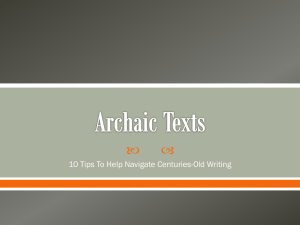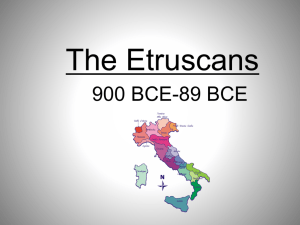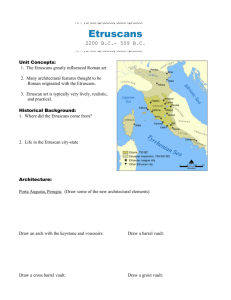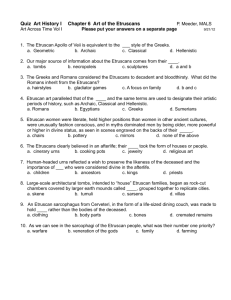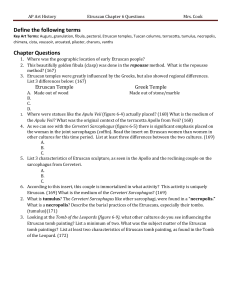Reclining couple
advertisement
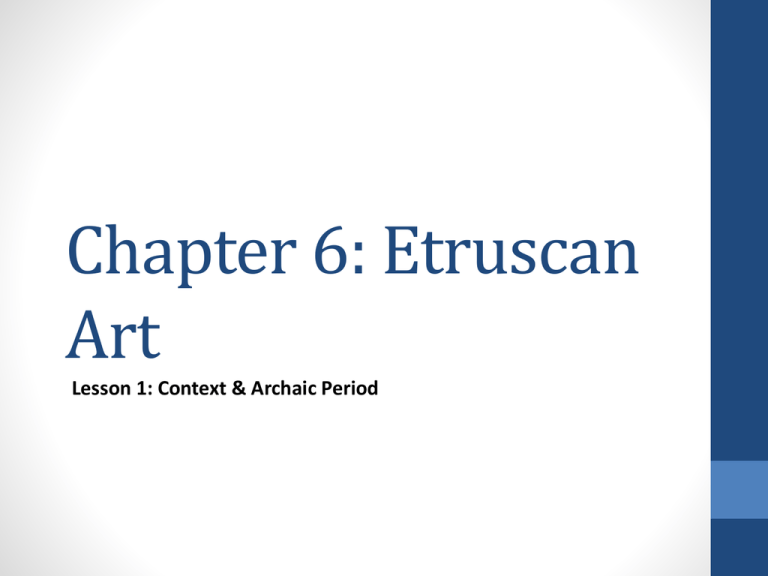
Chapter 6: Etruscan Art Lesson 1: Context & Archaic Period Warm-up 10-22-14 Respond to the following: Ch.6 L2 Etruscan Art Obj: SWBAT describe how the Greeks influenced the Etruscans HW: Read Pg. 164-176 Quiz on Chapter 6 and Cue Cards due Monday 10/27 1. What are Archaic elements of Apulu of Veii? 2. How is the work different from the Greek Archaic art? ARCHAIC PERIOD Apulu (Apollo of Veii) How does this differ from the Greek Kouros? 1. Depicts a God 2. Displayed atop a temple 3. Clothed 4. Stylized support (between legs) 5. More movement in pose Flashcard Apulu (Apollo) Announcements: 1st quarter Grades Due Friday Oct 24th HW: Read Pg. 164-176 Quiz on Chapter 6 and Cue Cards due Monday 10/27 Agenda: Warm-up Announcements and Reminders Quiz Review Etruscan Art Notes Office Hours Tuesday 3:00-4:00 Thursday 3:00-4:00 CHAPTER 5 QUIZ REVIEW The Parthenon Architecture Significant structural features Irregular features: 1. Curved stylobate– which leaves slight curve through the entablature 2. Columns lean in slightly 3. Corner columns are 2 inches thicker Meaning of Irregular features: each block had to be individual and unique to it’s place in the temple Curving horizontals and tilting vertical lines = Architectural contrapposto Compensation for optical illusions WHICH PLAN IS WHICH?? Temple of Hera I Unusual features: 1. row of columns dividing the cella Allowed no space for cult statue—possibly for 2 statues 2. Required an odd number of columns on outside facade & inside cella 3. 3 columns in antis Plan of Hera I temple The Parthenon plan Significant structural features: Cella had 4 Ionic columns and ionic frieze (but it’s a Doric style structure) Meaning (?): • Ionians are decedents of Athens • Athen’s is the leader of all the Greeks Plan of the Parthenon The Parthenon plan Significant structural features Cella had 4 Ionic columns and ionic frieze (but it’s a Doric style structure) Meaning (?): Ionians are decedents of Athens Athens is the leader of all the Greeks Etruscan Art ARCHAIC PERIOD http://college.cengage.com/art/shared/videos/Ancie ntRome/Tombs/index.html Sarcophagus with reclining couple from Cerveteri, Italy ca. 520 B.C.E. painted terracotta 45 1/2 in. high ARCHAIC PERIOD Sarcophagus with reclining couple, Cerveteri, Italy, ca. 520 B.C.E. Medium/materials: Terracotta (baked clay) Scale/size: 45 ½ inches Subjects (narrative): Elite couple reclining while taking part in a banquet Originally had food and perfume in hands ARCHAIC PERIOD Sarcophagus with reclining couple, Cerveteri, Italy, ca. 520 B.C.E. Stylistic features: Hand gestures are uniquely Etruscan Archaic features— Stiff Pose (more movement than Greek), archaic smile, knotted hair Unnatural transition from legs to torso ARCHAIC PERIOD Sarcophagus with reclining couple, Cerveteri, Italy, ca. 520 B.C.E. Function & significance: Function: funerary, sarcophogus of a husband & wife, contained ashes (most common burial practice) Shows the “Audacity” of Etruscan women—their independent spirit, higher status, and attendance of public events Tomb of the Triclinium, Tarquinia, Italy ca. 480-470 BCE ARCHAIC PERIOD Tomb of the Triclinium, Tarquinia, Italy, ca. 480-470 BCE Medium: Wall Painting Subject/Narrative: banqueters enjoying a dinner party The dancers and musicians, together with the feasting, suggest the overall friendly tone of the Etruscan funeral. funerals were often accompanied by games, ARCHAIC PERIOD Barbiton player on the left wall (detail), Tomb of the Triclinium, Subject/Narrative: banqueters enjoying a dinner party The dancers and musicians, together with the feasting, suggest the overall friendly tone of the Etruscan funeral. funerals were often accompanied by games ARCHAIC PERIOD Barbiton player on the left wall (detail), Tomb of the Triclinium, Subject/Narrative: banqueters enjoying a dinner party The dancers and musicians, together with the feasting, suggest the overall friendly tone of the Etruscan funeral. funerals were often accompanied by games ARCHAIC PERIOD Tomb of the Triclinium, Tarquinia, Italy, ca. 480-470 BCE Stylistic Characteristics Common painterly conventions of gender typing are employed— the skin of females is light in color while male skin is tinted a darker tone of orange-brown. Composite view--Figures heads in profile, bodies are forward ARCHAIC PERIOD Tomb of the Triclinium, Tarquinia, Italy, ca. 480-470 BCE Function & Significance subterranean rock-cut chambers Contain remains of the deceased also various grave goods or offerings reinforce the socio-economic position of the deceased person indications of wealth and civic achievements, public offices ETRUSCAN ARCHAIC ART HOMEWORK Apulu of Veii 1. To what extent is Greek influence found in the Etruscan work? To what extent is it missing? Capitoline Wolf 2. What is the narrative and significance of this work? Capitoline Wolf from Rome, Italy ca. 500-480 B.C.E. bronze 31 1/2 in. high
